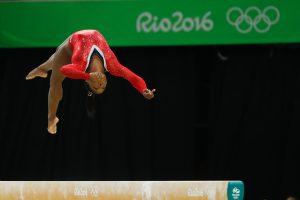Simone Biles, Tiger Woods, Michael Jordan, And Practicing Law: More Alike Than You Might Think
"Deliberate practice" is what separates superstars from the merely good, as managing partner Bruce Stachenfeld explains.

Simone Biles (by Fernando Frazão/Agência Brasil)
Have you heard of the concept of deliberate practice? There is a ton of literature on it if you Google it, but the lynchpin is that you break down what you do into tiny little pieces and work on those pieces until you don’t have to think about them any more, as they are just natural things you do without thought. There are a zillion examples of how deliberate practice can improve performance in sports, music, and just about everywhere else where skill or expertise is needed to achieve high-level results.
There is an anecdote about golfer Tiger Woods; when he was at the peak of his game, he literally started all over to revamp his swing, notwithstanding that he was already the best golfer in the world. He and his coach literally went back to the basics and started from scratch.

The Business Case For AI At Your Law Firm

There are also anecdotes about Michael Jordan. We all saw him floating in the air, but everything I heard said he practiced more hours a day than anyone else.
When I read about Simone Biles, she was just average until she increased her workouts from three days a week to six days a week; at which point she exploded to be a superstar.
Ultimately, my belief, which of course I cannot actually prove, is that deliberate practice is what separates those who become superstars from those who end up being merely good.
There is a quote you have probably heard: “Practice makes perfect.”
Sponsored

Is The Future Of Law Distributed? Lessons From The Tech Adoption Curve

Early Adopters Of Legal AI Gaining Competitive Edge In Marketplace

Legal AI: 3 Steps Law Firms Should Take Now

Navigating Financial Success by Avoiding Common Pitfalls and Maximizing Firm Performance
It is actually an awful and incorrect quote and can mislead you terribly. The correct quote should be: “Perfect practice makes perfect.”
Otherwise, you are merely getting better at doing things wrong. Deliberate practice means dissecting what you do into details and then working on those details to hone them to perfection, thereby increasing overall skill and performance ability.
I wonder, has anyone applied the concept of deliberate practice to the practice of law?
I don’t think so, but wonder how it would be done. Let me muse a bit here…..
The analytical problem to me is that law is rather messy compared to other things. If you are playing an instrument, you have the instrument and your goal is to make great music. If you are playing a sport, you know what the goals are as well. Practicing law, however, is really a combination of intellectual skills and interacting with human beings in a manner that allows you to achieve your clients’ goals. The goals are “messy” and hard to define and differ in different circumstances. So how could you apply deliberate practice here? I think the answer is that you can’t just apply it to “lawyering” as a whole; instead, you have to pick spots in your practice and apply it there.
Sponsored

The Business Case For AI At Your Law Firm


Navigating Financial Success by Avoiding Common Pitfalls and Maximizing Firm Performance
Here is a possible example. Say you are a real estate lawyer – like me – and you do a lot of negotiating. Well, how do you do it? Do you just make up a list of issues and go into the room and “go through the list” to see which points you can win for your client? Probably that is what you do, as that is what most people do.
How about if, instead, you started by getting and reading every single “gold standard” book in negotiation ever written? There probably are only about five or ten I would guess. Read them; and, don’t just read as if it were a novel, but rather take notes as ideas are given to you by other students of the negotiating game. When you are done, you would have a list of ideas. Then sit and “think” about how you might actually apply those ideas.
And then come up with a default strategy for your “usual” negotiation. And practice that strategy – looking in the mirror – with a colleague – in a group setting – by taking a course – with a coach – or other ideas – until you have it honed really well.
And then augment your default style by collecting an inventory of potential modifications, so that when you deal with an adversary who is – friendly – nasty – stupid – brilliant – pigheaded – smarter than you – older than you – a different culture – etc. – you can vary your negotiating skills appropriately.
And then maybe you start to become a real student of the game. It becomes a hobby as opposed to just a job. Maybe you start reading books like Sun Tzu’s The Art of War (affiliate link) and learn cool things like why it is best to have no style at all and to be like water, which has no form. When you attack water, it gives back, and when you retreat it moves forward – it has no shape and no style and therefore is hard to defeat.
Maybe you keep on reading and learning and thinking and practicing and practicing and practicing. But you don’t just practice irrelevantly; you practice with studious intensity, so you are “practicing perfectly.”
And maybe your negotiating skills go from good to great, and then from great to exceptional.
That is how I would do it, at least….

Bruce Stachenfeld
Bruce Stachenfeld is the managing partner of Duval & Stachenfeld LLP, an approximately 70-lawyer law firm based in midtown Manhattan. The firm is known as “The Pure Play in Real Estate Law” because all of its practice areas are focused around real estate. With more than 50 full-time real estate lawyers, the firm is one of the largest real estate law practices in New York City. You can contact Bruce by email at thehedgehoglawyer@gmail.com. Bruce also writes The Real Estate Philosopher™, which contains applications of Bruce’s eclectic, insightful, and outside-the-box thinking to the real estate world. If you would like to read previous articles or subscribe, please click here.







